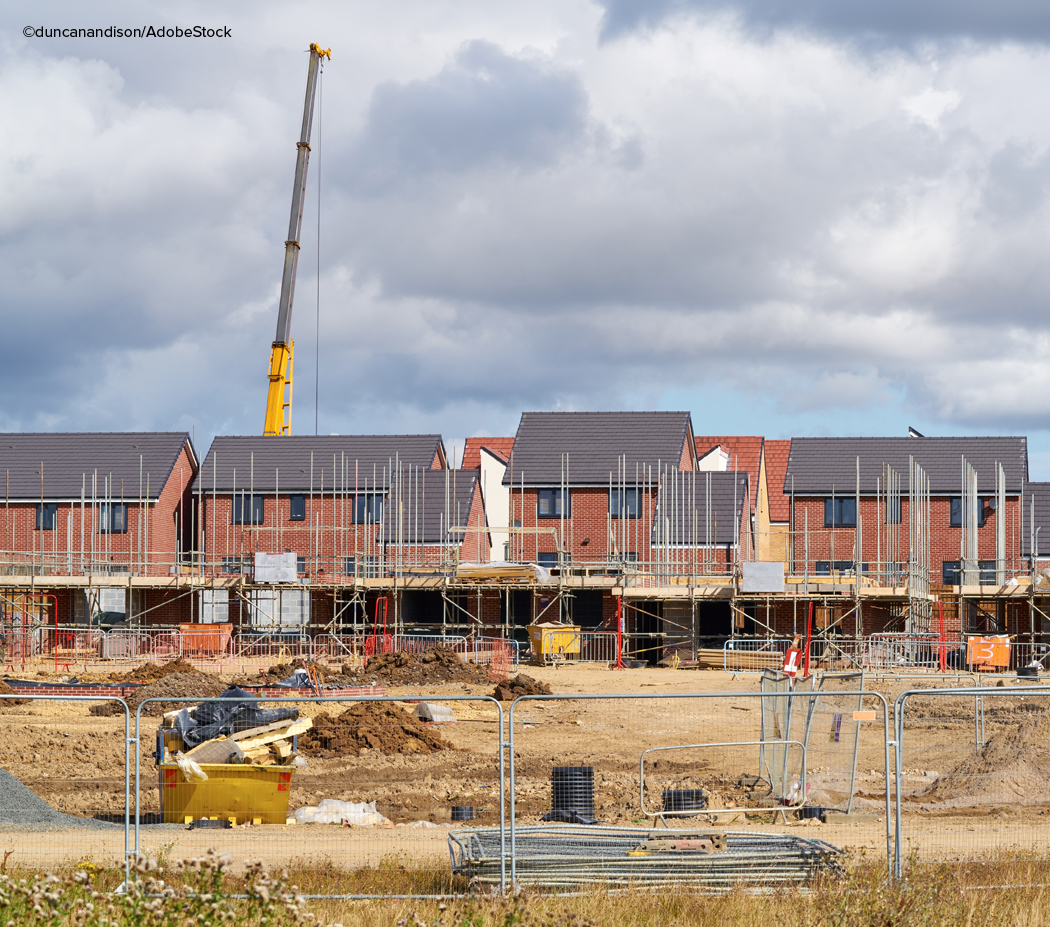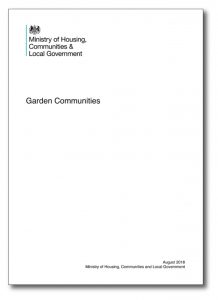
The new Garden Communities programme announced by Communities Secretary Rt Hon James Brokenshire will see more high quality homes built and green spaces created, expanding on government’s plans for more locally-led developments.
 The programme is part of government’s ambition to build 300,000 homes a year in England by the mid-2020s and is open to councils across England and private developers that have secured support from local authorities. The prospectus sets out the Government’s offer of assistance to councils, including resource funding, advice from Homes England and cross-government brokerage to resolve barriers to delivery. However, at this stage a funding package has not been announced.
The programme is part of government’s ambition to build 300,000 homes a year in England by the mid-2020s and is open to councils across England and private developers that have secured support from local authorities. The prospectus sets out the Government’s offer of assistance to councils, including resource funding, advice from Homes England and cross-government brokerage to resolve barriers to delivery. However, at this stage a funding package has not been announced.
Communities Secretary Rt Hon James Brokenshire MP said: “This plan is about the Government working with councils and developers to get great homes in keeping with beautiful areas in England. We want to help local authorities build strong and vibrant communities where people want to live, work, and raise families.
Government has said that ‘strong community involvement and engagement will be at the heart of judging garden community proposals; ensuring developments reflect local character while also designing beautiful green spaces near homes’.
Garden Communities can take the form of new villages, towns or cities and government believes have the potential to deliver well-designed homes at an increased scale, with projects ranging in size from 10,000 to 40,000 homes. The prospectus is the latest step by government to get Britain building, with 23 locally-led Garden Communities already receiving funding support. The launch signals the start of a three-month application process, with successful garden community proposals being announced later in the New Year.
Town and Country Planning Association
The TCPA welcomes the Government’s renewed support for creating high-quality new communities, set out in the Garden Communities prospectus.
Creating new communities is far more than a numbers game, and the Government’s prospectus rightly pays tribute to the TCPA’s founder, Ebenezer Howard, who recognised ‘…we need to build places people are happy to call home, places where they can come together to form thriving communities, places that lift our spirits whether we live in them or merely pass through’.
Kate Henderson, Chief Executive of the TCPA, said: “The Garden Communities prospectus illustrates the Government’s commitment to the opportunities provided by creating large-scale, sustainable new communities. The prospectus presents an exciting opportunity for councils to think strategically about the most sustainable long-term growth options for their local areas and to come forward with proposals for high-quality new Garden Communities.
“We particularly welcome the inclusion of garden city principles in the prospectus, and we urge local authorities pursuing this approach to adopt the principles as a framework, enabling the creation of genuinely affordable, inclusive, high-quality and climate-resilient new communities with the highest environmental standards.”
Kate Henderson, added: “We hope the Government will properly invest in this programme over the long-term to enable the creation of places which truly meet the ambitions of the garden city movement. The autumn budget is an opportunity for the government to be bold and brave in its commitment to unlocking the delivery of new Garden Communities and must ensure that the locations which are supported are truly exemplar.”
Royal Town Planning Institute
In response to the Government announcement of a new Garden Communities programme to increase the number of in garden towns in England, Victoria Hills MRTPI, Chief Executive of the Royal Town Planning Institute, said: “The Government’s garden towns programme is critical to solving the housing crisis and creating quality and healthy living places that so many of us desire and need. It is clear from our research that piecemeal incremental developments alone will not meet the demand for new quality homes.
“However, delivering large-scale development requires strategic leadership, skills and approaches that are likely to be unfamiliar to many local authorities. It is vital that planning teams are properly resourced to deliver at a more strategic level.
“We have seen too many large developments in the wrong place with no proper strategic planning and consideration for quality design, jobs, infrastructure and amenities. Central and local government must put proactive planning at the centre if they are serious about making a success of developing new garden villages and housing at scale.”
Campaign to Protect Rural England
The CPRE welcomes emphasis on brownfield and transformational regeneration, but is concerned the new Garden Communities programme will lead to residential-led sprawl.
Matt Thomson, Head of Planning at the Campaign to Protect Rural England, commented: “New emphasis on brownfield and transformational regeneration in the Government’s latest Garden Communities prospectus is welcome, but would be better placed if support for such schemes were prioritised.
“As a whole, though, the prospectus is another example of the ‘garden’ soubriquet being applied to even more random development proposals, which all seem to lead to low-density, car-dependent, residential-led sprawl.
“Even the revised NPPF recognises the importance of using what limited land we have more efficiently. We need to ask whether ‘homes with gardens’ are compatible with the achievement of sustainable, walkable communities, and we need to get the efficient use of land back onto the Garden Cities agenda.”








